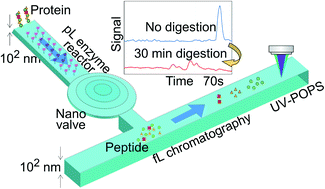Accelerated protein digestion and separation with picoliter volume utilizing nanofluidics†
Abstract
Single cell analyses can provide critical biological insight into cellular heterogeneity. In particular, the proteome, which governs cell functions, is much more difficult to analyze because it is principally impossible to amplify proteins compared to nucleic acids. The most promising approach to single cell proteomics is based on the liquid chromatography mass spectrometry (LC-MS) platform. However, pretreatments before MS detection have two critical issues for single cell analysis: analyte loss as a result of adsorption and artifacts due to the duration of analysis. This is a serious problem because single cells have a limited number of protein molecules and a small volume. To solve these issues, we developed an integrated nanofluidic device to manipulate samples on a femtoliter to picoliter (fL-pL) scale to achieve high-throughput analysis via suppressing analyte loss. This device can perform tryptic digestion, chromatographic separation, and non-labeled detection with high consistency. In addition, we introduced an open/close valve by physical deformation of glass on a nanometer scale to independently modify the nanochannel surfaces and control sample aliquots. The injection system equipped with this valve achieved an injection volume of 1.0 ± 0.1 pL. By using this integrated device, we found that the chromatogram of bulk-digestion for 12 hours resembled that of 15 min-digestion in the nanochannel, which indicated that these conditions reached a similar state of digestion. Therefore, an integrated device for ultra-fast protein analysis was developed on a 1 pL scale for the first time.

- This article is part of the themed collection: Lab on a Chip HOT Articles 2022


 Please wait while we load your content...
Please wait while we load your content...